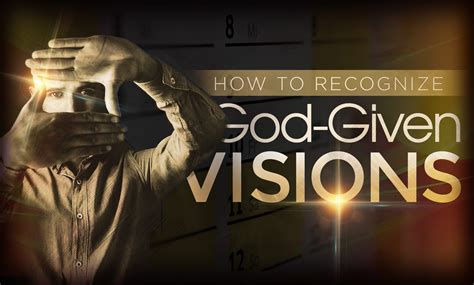Decode the Divine: Understanding God's Visions
For centuries, humans have sought to understand divine communication, often manifested through visions. These experiences, deeply personal and profoundly impactful, can range from fleeting glimpses to extended, immersive encounters. But how do we interpret these powerful encounters? How do we distinguish genuine divine visions from other psychological or neurological phenomena? This article explores the multifaceted nature of God's visions, examining their historical context, psychological aspects, and potential interpretations.
What are God's Visions?
God's visions, in the broadest sense, refer to experiences where individuals perceive divine communication in a visual or symbolic form. These visions are often described as intensely personal and transformative encounters, leaving a lasting impact on the recipient's life and beliefs. They are not necessarily limited to religious contexts; similar experiences might be described within spiritual or mystical traditions across various cultures. The key element is the perceived encounter with a higher power or a profound spiritual reality.
Are Visions Always Religious?
H2: Can Visions Be a Result of Psychological or Neurological Factors?
Yes, absolutely. While many interpret visions as divine messages, it's crucial to acknowledge the potential influence of psychological and neurological factors. Conditions like migraines, epilepsy, sleep deprivation, and certain mental health conditions can trigger visual hallucinations that might be misinterpreted as divine visions. Similarly, intense emotional states, heightened stress, or near-death experiences can also lead to altered perceptual states that generate vivid imagery. It's vital to consider these factors when evaluating the nature of a vision. A consultation with a medical professional can help rule out any underlying medical conditions.
How to Discern Between a True Vision and a Hallucination?
Discerning between a true vision and a hallucination isn't always straightforward. It's a deeply personal journey requiring introspection, prayer (for those of faith), and potentially guidance from spiritual leaders or mental health professionals. Some factors to consider include:
- The nature of the vision: Was it fleeting and unclear, or detailed and profound? Did it align with existing beliefs or challenge them in a significant way?
- The impact of the vision: Did the vision lead to positive changes in life, increased compassion, or a deeper connection to spirituality? Or did it lead to anxiety, fear, or confusion?
- Confirmation and guidance: Did the vision resonate with other aspects of one's life, perhaps through scripture, prayer, or the counsel of trusted spiritual advisors? Did it lead to actions that felt morally right and aligned with one's values?
Interpreting God's Visions: A Guide to Understanding the Message
Interpreting a vision requires careful consideration and humility. There's no single "correct" method, as the meaning is often personal and symbolic. Some guidelines include:
- Prayer and meditation: Spend time in quiet reflection, praying for guidance and insight into the vision's meaning.
- Study of scripture and spiritual texts: Search for parallels or symbolic interpretations in religious or spiritual literature.
- Seek counsel from trusted spiritual leaders: Discuss the vision with trusted mentors or religious figures for guidance and perspective.
- Journaling and reflection: Write down your experiences and thoughts, tracking any recurring themes or patterns.
Different Types of Visions and their Interpretations
Visions can manifest in various forms, each potentially carrying a unique meaning:
- Symbolic visions: These visions communicate through symbols, requiring interpretation based on personal experiences and spiritual understanding.
- Prophetic visions: These visions often foretell future events or reveal hidden knowledge.
- Transformative visions: These visions fundamentally change the recipient's worldview and spiritual path.
The Importance of Context in Understanding Divine Visions
The context surrounding a vision is crucial to its interpretation. Factors such as the individual's spiritual background, current life circumstances, and prayerful intentions should be considered. A vision experienced during a time of crisis might carry a different meaning than one experienced during a time of peace and serenity.
Conclusion: Embracing the Mystery
Understanding God's visions is a journey of faith, introspection, and discernment. While acknowledging the potential of psychological and neurological factors, we can approach these experiences with reverence and a desire to understand the divine message they might contain. The interpretation is a personal process, often requiring guidance, reflection, and a willingness to embrace the mystery and wonder of the divine. Remember to always seek counsel from trusted spiritual advisors and medical professionals as needed.

